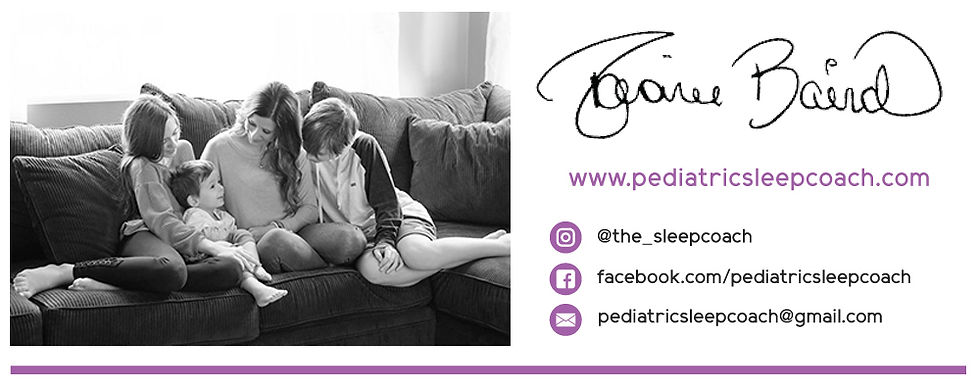Troubleshooting Short Naps
- Desiree Baird
- Apr 13, 2021
- 4 min read
If just mentioning the word “short” while talking about naps makes you stressed out, you are definitely not alone. When you feel like your baby is finally into the groove of regular naps, only to throw you a curveball and suddenly start sleeping for shorter periods of time, it may be normal, but that doesn’t make it easy.
The truth is that short naps are often normal for the age group of 3-6 months. Heck, I went through it with my daughter 12 years ago. She was a very reliable "40 minute napper." It was so frustrating and unfortunately my pediatrician didn't help me and the was my support system at the time. Luckily you have found me and my blog post in which I am going to share some tips and tricks to help lengthen these mini naps so you can get that much-needed mid-day rest too!

First, What’s Really Considered a “Short Nap” & Why Can it Become a Problem Long Term?
Let’s cover some basics — what’s really a short nap? We classify short naps as naps that don’t last any longer than one sleep cycle (generally around 50 minutes). So, if you find your little one waking up shortly after going to sleep, it may have to do with the fact that they aren’t connecting their sleep cycles.
The problem with this long term is that if your baby is waking up after just one sleep cycle, they likely aren’t getting that deep sleep they need throughout the day. This can lead to irritability, and it may affect nighttime sleep.
Why Short Naps Tend to Happen From 3-6 Months
While short naps (long term) can cause some further sleep issues, it’s important to note that it’s actually pretty normal from ages 3-6 months. When looking to lengthen naps you should ensure room environment and schedule is on point for their age, along with routines and zero sleep props. Sometimes day sleep doesn't get better until night sleep is at its best. Lastly, naps may start to lengthen when your baby matures a bit and has the capability to connect sleep cycles (usually after 20 weeks past due date). But, the good news is that there are some tips and tricks to help support healthy nap sleep habits now.
Nap Training Tips
One of the most important things to understand is that once your little one is developmentally ready, longer naps will come! But, you can meet your baby where he or she is right now with gentle sleep-supporting tips.
Here are some ways to help establish healthy nap habits:
#1 Establish a Calming Naptime Routine
Just as you may already have a nighttime routine, create a nap routine as well! This will help signal that it’s time for rest.

#2 Set the Room up For Nap Success!
Is the room dark enough, like REALLY dark? What’s the temperature of the room? These are two very important questions that can be a simple way to support better naps. Investing in blackout curtains can be helpful to keep the daylight out during nap time, and making sure it’s not too hot or cold (between 68 and 72 degrees) is important for creating the optimal environment for sleep.
#3 Squeeze in Enough Wake & Play Time Before Nap
Another thing to consider is whether or not your baby is tired enough to nap. If you notice your little one is starting to nap for shorter periods of time, it may be time to evaluate if extended awake and playtime is needed before nap time — note that some adjusting of nap and awake times is normal as your baby goes through different developmental stages.
On the flip side, you don’t want to have too much awake and playtime to where you then have an overtired baby! It’s about finding that perfect balance for you and your little one. If you think your baby could use some extra time awake before nap, try pushing nap time out just ten minutes at a time until you find that sweet spot. Always take it slow and pause for a few days to see if nap lengthens.

#4 Consider a Noise Machine
White noise machines can be such a simple, but often effective way of supporting sleep. They can be especially helpful for daytime naps where there may be lots of noise going on around the house. Having white noise on during naps and nighttime is also a great way to signal that it’s time for bed. You can read more about the benefits of white noise here.
Surviving The Short Nap Stage
Let’s face it — nap time is just as important for us mamas as it is for our growing babies. We need time to rest and rejuvenate as well. So, if your little one is around the age of 3-6 months and has suddenly started napping for shorter periods of time, chances are, this is a phase that won’t last forever. But it definitely isn’t easy!
Use these tips to help support healthy nap habits, and if you’re still dealing with short nap struggles, drop questions below in the comments section, or email me to schedule a FREE 30 minute discovery call so we can discuss how to work together and get those naps in place!





Comments